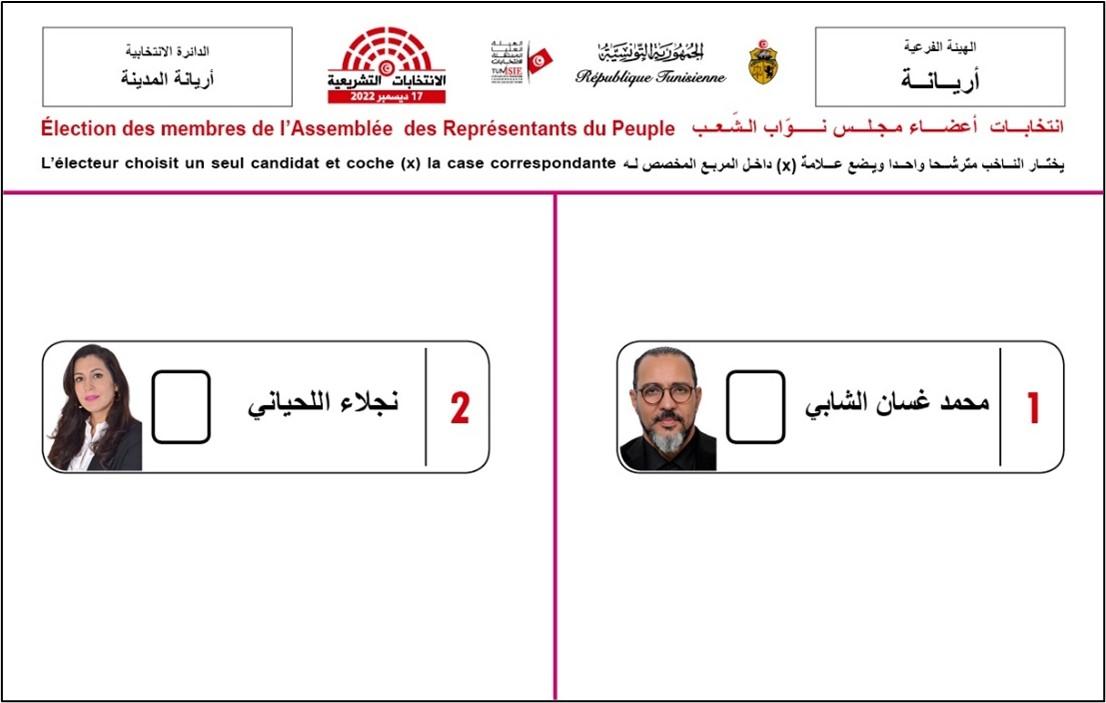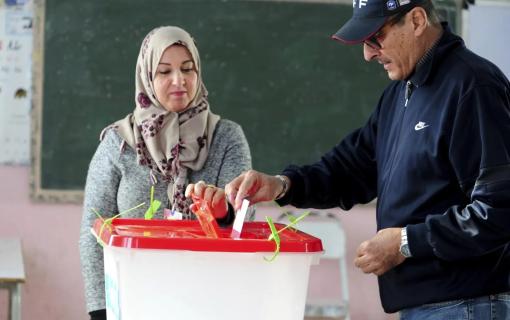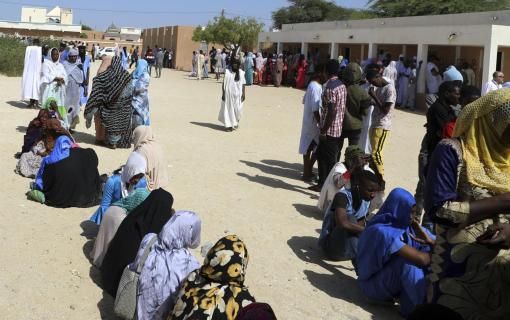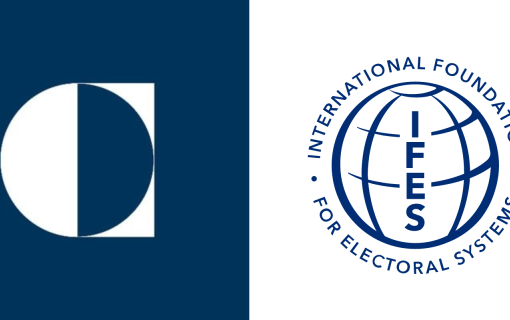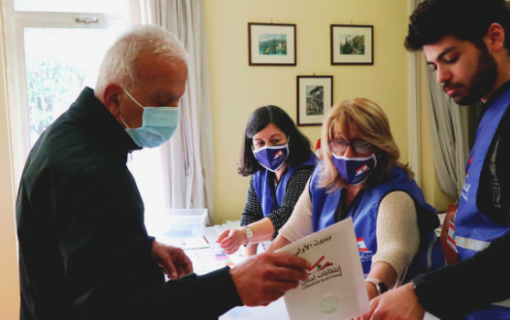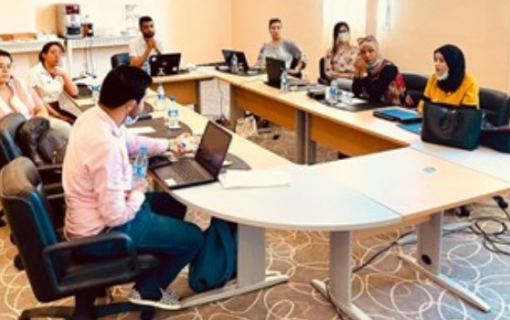Elections in Tunisia: 2022 Parliamentary Elections
On Saturday, Dec. 17, Tunisians will elect the lower house of Parliament, the Assembly of the Representatives of the People (ARP). These are the first legislative elections since the new Constitution was adopted by referendum on July 25, 2022, and will take place under a new electoral system and revised legal framework.
The last legislative elections took place in October 2019, but members could not complete their five-year terms because President Kais Saied dissolved Parliament in March 2022. Under the new Constitution, Tunisia now has a bicameral Parliament. The upper chamber, the National Assembly of Regions and Districts (NARD), will be elected indirectly on a date yet to be determined. Members of the NARD are designated by directly elected regional councils.
To help you understand this important electoral process, the International Foundation for Electoral Systems (IFES) provides Frequently Asked Questions (FAQs) on Elections in Tunisia: 2022 Parliamentary Elections.
Learn more about IFES' programs in Tunisia and follow @IFESTunisia on Twitter.
Additionally, visit IFES' Election Guide for the most comprehensive and timely verified election information available online.
Frequently Asked Questions (FAQs)
The election of Tunisia’s Assembly of the Representatives of the People will take place on Saturday, Dec. 17, 2022. Tunisians voting from abroad will cast their ballots from Thursday, Dec. 15 through Saturday, Dec. 17.
Tunisian voters will be called to elect the lower house of Parliament, the Assembly of the Representatives of the People (ARP). The last legislative elections took place in October 2019, but members could not complete their five-year terms because President Kais Saied dissolved Parliament in March 2022. Under the new Constitution adopted by referendum on July 25, 2022, Tunisia now has a bicameral Parliament. The upper chamber, the National Assembly of Regions and Districts (NARD), will be elected indirectly on a date yet to be determined. Members of the NARD are designated by directly elected regional councils.
In accordance with the new Constitution, the ARP consists of 161 deputies (compared to 217 under the previous Constitution), elected directly for five-year terms, including 10 deputies representing Tunisians residing abroad. According to Article 71 of the 2022 Constitution, the first session of the ARP will begin no more than 15 days after the proclamation of the final results of the election. The President of the Republic will convene the first meeting since the previous Assembly has been dissolved, expected approximately in March 2023.
The 161 deputies will be elected directly through a two-round majoritarian system. This follows amendments to the 2014 Electoral Law that were enacted on Sept. 15, 2022, just three months before Election Day, which changed the system from a closed list proportional system.
Decree Law 55 (DL-55) also modified the delimitation of electoral boundaries. Of the 161 electoral constituencies, 151 are on national territory and 10 are abroad. DL-55 does not detail the criteria for the new electoral boundaries, and there have been no broad consultations to inform the matter. Each in-country electoral district corresponds to the borders of one or more existing administrative entities — either a delegation (Moutamdya) or a sector (Imada). The new electoral boundaries do not meet the conditions for equal representation, in which each deputy represents an equivalent number of inhabitants and/or voters.
A candidate who receives an absolute majority of the votes cast in that electoral district is immediately elected. If no candidate receives an absolute majority, a second round shall be held within two weeks of the publication of the results of the first round. In this case, the second round will be between the two candidates who received the highest number of votes in the first round. The candidate who receives the majority of votes in the second round is declared elected. When only one candidate stands in the electoral district, he or she is elected regardless of the number of votes obtained.
The revised Electoral Law does not include measures to encourage the representation of women and other marginalized populations. The new electoral system eliminates the requirement in the previous party list system of alternating male and female candidates on the list and of including candidates under 35 and persons with disabilities. This might result in significantly reduced representation of women and youth in the Assembly of the Representatives of the People.
In line with the 2022 Constitution, the Electoral Law includes provisions for initiating the revocation of a deputy’s mandate in three cases:
- Breach of integrity;
- Breach of the deputy’s parliamentary obligations; or
- Failure to make the efforts necessary to carry out the deputy’s electoral program.
The Electoral Law prohibits the submission of more than one petition for revocation of office against the same deputy during the same tenure. It also prohibits initiation of the revocation procedure during the first year or the last six months of their legislative mandate. In order to trigger a recall election, the petition for dismissal must be signed by 10 percent of the registered voters in the electoral district from which the deputy was elected. If the petition is accepted, the High Independent Authority for Elections (ISIE) has 60 days to set the date of the recall election. If a majority of voters accept dismissal, the deputy loses his or her status as a member of Parliament, and a by-election shall be organized within three months.
In addition to limited constitutional provisions, the rules that apply to parliamentary elections are mainly found in the Electoral Law and regulatory decisions. The main legislative text applicable to legislative elections is Organic Law No. 2014-16 of May 26, 2014 on elections and referendums, as amended and supplemented by subsequent texts and, in particular, by Decree Law 55 (known as the Electoral Law).
The second important piece of legislation on elections in general, including legislative elections, is Organic Law No. 2012-23 of Dec. 20, 2012 on the creation of High Independent Authority for Elections (ISIE), as amended and supplemented by subsequent texts and in particular by Decree Law No. 2022-22 of April 21, 2022.
In addition to legislative texts, the organization of legislative elections is governed by regulatory decisions adopted by the ISIE. These decisions supplement and detail provisions of the Electoral Law. In particular, they concern the organization and functioning of the ISIE's structures; the electoral calendar; voter registration; candidate nomination; the accreditation of observers; the campaign, including financing and media coverage; and the procedures for voting, counting, tabulating, and announcing results. In addition to the regulations issued by the ISIE, a decree setting the limits of electoral expenses and private financing of legislative electoral campaigns is adopted by the President of the Republic.
The High Independent Authority for Elections (ISIE) is responsible for the organization and supervision of national (presidential and parliamentary) elections, as well as referendums and local (municipal and regional) elections. It is responsible for the regularity, integrity and transparency of the electoral process.
The ISIE consists of a decision-making body (the board) and an executive body (the Executive Secretariat). With the amendment of the ISIE law by Decree Law No. 2022-22 of April 21, 2022, the board consists of seven members, including the president, who are appointed by the President of the Republic for a non-renewable four-year term. Previously, the board had nine members elected by a two-thirds majority by the Assembly of the Representatives of the People for a non-renewable term of six years. Board members are required to be independent and neutral and have proven experience in their respective professional fields. The board takes decisions by a majority vote of members present; in the event of a tie, the president casts the deciding vote. The board adopts all decisions necessary to implement electoral legislation. It is also responsible for ensuring the integrity and transparency of the electoral process and for announcing the results.
The Executive Secretariat is composed of several departments that manage all administrative, financial and technical matters under the authority of the ISIE president. It is headed by an executive director appointed by, and accountable to, the ISIE president. The ISIE has 27 permanent regional administrations reporting to the executive body that are headed by regional directors. In addition, the ISIE board may create temporary regional election commissions, called the Independent Regional Authorities for Elections (IRIE in French) for each election. For the 2022 legislative elections, the ISIE created 27 IRIEs in Tunisia and 10 abroad, composed of three members appointed by the ISIE board.8 As temporary bodies, the IRIE do not have any powers or competencies. They carry out the functions expressly delegated to them by the ISIE board.
For these elections, the important role of the IRIEs and regional administrations includes monitoring voter registration and related challenges; managing the candidate nomination process and related disputes; overseeing campaign activities and financing; accrediting candidates' representatives; and organizing voting and the counting and tabulation of results.
According to the Constitution and electoral legislation, a voter must have Tunisian nationality, be at least 18 years of age on Election Day, enjoy civil and political rights, not be incapacitated and be registered in voters lists based on his or her effective residence address. Decree Law 55 broadened the scope of those ineligible to vote. It prohibits the right to vote for persons sentenced to a criminal penalty, expressly barring them from voting as a complementary penalty. It also extends the prohibition on voting to any person under judicial guardianship, without distinguishing among different types of guardianship.
The amended Electoral Law prohibits active military personnel, civilians carrying out their military service (conscripts) and those serving agents of the internal security forces from exercising their right to vote. Previously, those citizens could vote in municipal and regional elections.
Voter registration methods changed in 2022. Before the constitutional referendum of July 25, 2022, only voluntary in-person registration was possible. Now, the Electoral Law allows the High Independent Authority for Elections (ISIE) to proceed with automatic registration12 of voters, in addition to voluntary registration. For these elections, the ISIE updated the lists of voters established for the constitutional referendum using this mixed registration method.
The final electoral rolls were to be made public on Nov. 24, 2022; however, they were not released. According to figures announced by the ISIE, the total number of registered voters for the legislative elections is 9,339,756 (compared to 9,278,541 registered in the 2022 referendum). This includes 8,981,463 registered voters in Tunisia and marks a significant increase from the 7,065,885 registered voters for the 2019 legislative elections, in part due to the automatic registration of voters.
The recent amendments to the legal framework added to the requirements for parliamentary candidacy while adapting the existing requirements to the new voting system. A candidate must:
- Be of Tunisian nationality, born to a Tunisian father or mother and holding no nationality other than Tunisian nationality (candidates in a constituency abroad are allowed to have dual nationality);
- Be a registered voter in the electoral district from which he or she intends to run;
- Be at least 23 years of age at the time of application;
- Reside within the territory of the electoral district from which he or she intends to run;
- Have a criminal record free of any intentional crimes;
- Not be ineligible to stand for election;
- Not have held office for at least one year involving certain functions in the electoral district in which he or she is standing (for example, serving as a member of the government, magistrate, head of diplomatic or consular mission, manager, delegate, imam or president of a sports structure);
- Have paid mandatory state and local taxes; and
- Submit 400 endorsements from voters registered in the electoral district and a summary of the electoral platform. The list must include the signatures of 200 women and 200 men, 25 percent of whom must be under 35 years old. Voters are prohibited from sponsoring more than one candidate.
A total of 1,427 individuals (1,213 men and 214 women) applied to the Independent Regional Authorities for Elections (IRIEs) to compete in these elections. On Nov. 21, after the litigation phase, the ISIE announced the acceptance of 1,055 candidates, including 173 women (nearly 16 percent). Of those, 1,052 candidates are standing in the 151 constituencies in Tunisia, and three in three constituencies abroad. Seven of the 10 overseas electoral districts had no candidates, and 10 constituencies registered only one candidate. Elections will therefore be competed in only 154 electoral districts. For the remaining seven districts, by-elections will need to be organized at a later stage.
The Independent Regional Authorities for Elections’ (IRIEs) decisions regarding candidates’ applications may be challenged before the territorially competent chambers of the Administrative Court. First-instance judgements may be appealed to the Appeals Chambers of the Administrative Tribunal based in Tunis; its decisions are irrevocable. Only candidates may refer the matter to the competent courts in disputes.
Challenges must be lodged no more than two days from the date of notification of the decision; appeals of first-instance decisions must also be filed within two days from the date of notification of the contested judgment. For applications to be formally admissible, a bailiff must provide a proof of notification to the opposing parties (IRIEs, the other candidate concerned) before the end of the appeal period. In addition, the law requires the service of a lawyer for appeals.
The time limits for the competent courts to deliver their judgments (including the hearing, deliberation and delivery of judgment) are set at a maximum of five days for the first instance and six days for appeals.
As part of the dispute over candidacies for the 2022 legislative elections, the Administrative Tribunal received 54 challenges at first instance and 15 appeals. The court’s final judgments upheld the decisions of the IRIEs in 52 cases and annulled the decisions in two cases, which ultimately allowed the validation of two applications that IRIEs had initially rejected.
The Electoral Law defines three separate campaign phases:
- The election period includes the pre-election campaign phase, the official campaign and the period of silence. The electoral silence includes the day before polling and Election Day, until the last polling station closes. For these parliamentary elections, the electoral period began on Sept. 25, 2022.
- The pre-election campaign starts two months before the election campaign begins. During this period, the Independent High Authority for Audiovisual Communication (HAICA) must guarantee all political candidates the right to access TVs and radios based on the principle of pluralism. For these elections, the pre-election campaign period lasted from Sept. 25 until Nov. 24, 2022.
- The election campaign refers to all activities that candidates or their supporters carry out to publicize their election platforms to convincing voters to elect them. The election campaign begins 22 days before the election and closes 24 hours before polling begins. For these parliamentary elections, the campaign began at midnight on Nov. 25 and will end at midnight on Thursday, Dec. 15.
The 22-day election campaign is governed by the following principles:
- The neutrality of the administration, places of worship and the national media;
- The transparency of the electoral campaign;
- Equal opportunities for all candidates;
- Respect for the physical integrity, honor and dignity of candidates and voters and for the privacy and personal data of candidates; and
- Non-incitement to hatred, violence, intolerance, and discrimination on the basis of religion, group, family or region.
Candidates belonging to political parties can campaign on behalf of their party only if they present an authorization to do so delivered in advance by the party's legal representative. However, political parties are not allowed to finance their candidates' electoral campaigns.
During the entire election period, candidates are prohibited from engaging in political advertising that uses commercial marketing techniques. During this period, it is also forbidden to publish the results of opinion polls and comments on those polls that relate directly or indirectly to the elections.
During the election campaign, candidates may engage in electoral campaigning through public meetings, demonstrations, marches and rallies that must be declared in advance to the High Independent Authority for Elections (ISIE). Candidates can also advertise through fixed (billboards) or mobile means (tours) or through print or electronic media (websites or sponsored pages on social networks). Candidates may also make election announcements in formats defined by the law as posters, leaflets, programs and information on meeting dates. These announcements can be made through TV, radio, print or electronic print media.
Electoral campaigning is prohibited in schools, universities, vocational training buildings and places of worship. It is also forbidden to distribute documents or conduct electoral campaigning in the public administration and public companies. This prohibition also applies to private companies that are not open to the public. The law prohibits the use of public resources for the benefit of a candidate.
Candidates have the right to campaign through national and electronic media. However, campaigning through foreign media is strictly forbidden for candidates in Tunisia. Only candidates in electoral districts abroad are allowed to use the foreign media as part of their electoral campaigning.
Decree Law 55 repealed public financing for electoral candidates. Electoral campaigns are now funded exclusively through self-financing of candidates and private financing. Private funding comes from donations from individuals, capped at 20 times the minimum wage (9,185 Tunisian dinars, or $2,810). Donations from legal entities (such as commercial companies, associations and others) are prohibited. Foreign funding or funding from unknown sources is also prohibited. However, financing of candidates in electoral districts abroad by Tunisians residing abroad is not considered foreign funding. The use of any form of hidden financing, such as using public resources or charitable activities to promote a candidate is also forbidden.
Candidates must comply with spending limits established for each of the 161 constituencies. These range from $1,418 to $12,580.19 Spending limits are calculated based on the number of registered voters and the number of residents in each constituency. The amounts may increase according to the population density of the electoral district. Overall, private funding cannot exceed 80 percent of the overall spending limit for each candidate.
Both the High Independent Authority for Elections (ISIE) and the Court of Auditors exercise oversight of campaign financing.
During the electoral campaign, the ISIE will deploy 1,674 field controllers to monitor campaign activities, assess their costs and record any violations. They will monitor compliance in collaboration with public bodies including the Central Bank of Tunisia and the Court of Auditors. The ISIE is entitled to refer violations of campaign rules to the public prosecutor. In addition, the ISIE may also annul the election results of a winner in case of a violation that has had a substantial and decisive impact on the results.
After the announcement of final results, the Court of Auditors verifies the legality, integrity and exhaustivity of income and expenditures allocated to each candidate’s campaign. It checks that the expenditures ceiling is respected by the candidates and that they receive donations within the limits fixed by the law. The Court of Auditors issues a final report on campaign financing six months after the final results are announced. It may impose financial and/or electoral sanctions on candidates who breached certain rules related to funding.
Throughout the election campaign, the media are required to:
- Demonstrate neutrality;
- Respect the principle of equality and guarantee equal opportunities among candidates;
- Respect the physical integrity, honor and dignity of candidates and voters;
- Avoid infringing upon the privacy of candidates and their personal data;
- Comply with the requirements of public safety and national defense; and
- Avoid disseminating or publishing calls for hatred, violence, fanatism or discrimination based on religion, race, group or family.
During the election period, the media are prohibited from engaging in political advertising, broadcasting or publishing any biased media coverage that benefits a specific candidate. However, candidates receive equal amounts of free airtime on national TV and radio to present themselves and their platforms.
By law, the Independent High Authority for Audiovisual Communication (HAICA) is responsible for monitoring and controlling the use of radio and television, for example, during the election campaign. It guarantees pluralism and ensures candidates' access to such media during the campaign. While the HAICA monitors the coverage of elections by TV and radio, the High Independent Authority for Elections (ISIE) monitors written and electronic press. However, for the legislative elections, the ISIE and the HAICA have disagreed over their respective media-related competencies. By law, the ISIE and the HAICA should publish a joint decision. However, both the HAICA and the ISIE have issued separate decisions related to the rules on coverage by electronic (TV and radio) media. The separate rules sowed confusion regarding the rules that the media should respect. Furthermore, the ISIE announced that it would monitor electronic media, encroaching upon the prerogative of the HAICA provided by law. The HAICA has monitored coverage by TV and radio in all past elections. As a result, the HAICA has lodged a complaint against the ISIE to the Administrative Tribunal. As of the publication of these FAQs, this conflict has not been resolved, and it is unclear which rules TVs and radios will follow in covering the elections.
For the December legislative elections, the High Independent Authority for Elections (ISIE) plans to open 4,691 voting centers (4,551 in Tunisia and 140 abroad), each consisting of one or more polling stations. Voting center staff consists of a president and one or more information officers appointed by the ISIE. The president maintains order within the center, ensures coordination and logistical operations and facilitates the work of the poll workers.
A total of 11,485 polling stations will be available to voters, including 11,310 polling stations in Tunisia and 175 abroad. Each should have a president and two members. Poll workers’ tasks include, among others, checking voters’ identity, inking their index fingers, handing over ballot papers and monitoring the ballot box. They also count the ballots in polling stations immediately after the close of voting, in the presence of observers and representatives of the candidates.
Citizens can find out their assigned polling station by dialing *195* followed by a national identity card number. A response provides the citizen’s electoral district, voting center and relevant polling station.
Voting starts at 8 a.m. and ends at 6 p.m. Voters who are inside the voting center at the time voting closes are allowed to vote. When the count is finalized, a copy of the minutes from the counting is posted outside the polling station and published on the ISIE's website. Observers do not receive copies of the count.
On Election Night, 27 tabulation centers will compile the results from polling stations for the 154 electoral districts where elections are held in 2022. The tabulated results are then transmitted to the ISIE board for verification and announcement of the preliminary election results.
Each electoral district will have a different ballot, each containing the number, name and photo of each candidate. Candidates are listed in several columns. Voters must mark their choice in a box positioned before the name of each candidate. If a voter chooses more than one candidate, the ballot will be considered invalid.
The Electoral Law enshrines the principles of personal and secret vote for all voters, including those with disabilities. To this end, the election law requires polling stations to be accessible to measures for the benefit of voters with disabilities, including those who are blind or have low vision and those with physical disabilities. On Election Day, these two categories of voters have the right to receive assistance from a voter of their choice who can help them vote if the following requirements are met:
- The voter presents a handicap card.
- The assistant must be an eligible voter.
- The assistant must be either the spouse or a relative of the voter with a disability. In addition to showing his or her national identity card, the assistant must present an official document describing his or her relationship to the voter. In the absence of an assistant from his or her family, a voter may ask the president of the polling station to instruct a voter present at the polling station to provide assistance.
- The same assistant may not accompany more than one voter with a disability.
Braille ballot folders containing the ballot paper will be available in each polling center for voters who are blind or have low vision. These ballot folders will bear the number but not the name of each candidate. The braille folder will include a note in braille that enables voters to match the name and the number of each candidate in the electoral constituencies.
The Electoral Law permits observation of the elections by national and foreign observers, as well as candidate representatives. Recent legal amendments do not allow political parties to request accreditation to observe parliamentary elections. To carry out their duties, observers must obtain official accreditation from the High Independent Authority for Elections (ISIE). Applications for accreditation close no later than one week before Election Day. For these elections, the deadline is Dec. 9.
first round no later than three days after Election Day, Tuesday, Dec. 20. The preliminary results must be published in detail and listed by polling station, on the ISIE website.
Once the litigation phase related to the preliminary results has ended, the ISIE will have 48 hours to announce the final official results. According to the electoral calendar, the results must be announced officially no later than Thursday, Jan. 19, 2023. On the same day, the ISIE will announce the date of second round of voting for those candidates who did not receive more than 50 percent of votes in the first round. The final results must be published on the ISIE website and in the Official Gazette of the Republic of Tunisia.
The ISIE announced an indicative calendar for the second round, which will depend on when the results of the first round are announced, and the adjudication period has closed. This calendar is as follows:
- Electoral campaign: Jan. 20 to 27, 2023;
- Election Day: Jan. 29, 2023, for in-country voting and Jan. 27 to 29 for out-of-country voting;
- Preliminary results: No later than Feb. 1, 2023;
- Election results disputes: Filed from Feb. 2 to March 2, 2023;
- Final results: No later than March 3, 2023.
The preliminary results of the election may be contested to the appeal chambers of the Administrative Tribunal in Tunis within three days of the publication of the results by the High Independent Authority for Elections (ISIE). For legislative elections, only candidates have the right to appeal, and only in the constituency in which they ran. The request for appeal must be submitted by a cassation lawyer, accompanied by evidence and proof of the notification of appeal to the ISIE and any related party. The Appeals Chamber shall conduct the hearing within three days from the filing of the challenge. The judgment must be delivered within five days after the hearing, and the parties must be notified of the decision within three days.
First-instance judgments rendered by appeals chambers may be appealed before the Plenary Assembly of the Administrative Tribunal. An appeal must be lodged within three days from the notification of the first-instance judgment. The first president of the Administrative Tribunal shall schedule the hearing within three days, and the judgment on appeal shall be rendered within seven days after the hearing. The parties shall be notified within two days of the judgment. The judgment rendered on appeal is final.
- Constitution of July 25, 2022
- Organic Law No. 2014-16 of May 26, 2014, relating to elections and referendums, as amended and supplemented by subsequent texts and in particular by Decree-Law No. 2022-55 of Sept. 15, 2022
- Organic Law No. 2012-23 of Dec. 20, 2012, on the Independent High Authority for Elections, as amended and supplemented by subsequent texts and in particular Decree-Law No. 2022-22 of April 21, 2022
- Decisions, procedures, manuals and others published on the website of the High Independent Authority for Elections (Arabic only)
Since 2011, the International Foundation for Electoral Systems (IFES) has supported Tunisia’s democratic transition by partnering with civil society, government institutions and other electoral stakeholders to strengthen and reinforce a culture of inclusive and participatory democracy. In just over a decade, IFES has established itself as a trusted and effective partner to provide technical support in the areas of civic education, voter information, democratic governance, electoral administration, electoral developments analysis, legal assessments and training and capacity building of Tunisian media stakeholders. In all programming, IFES has worked to ensure inclusive programming tailored to increase the electoral participation of women, people living with disabilities, young people and Black Tunisians, among other marginalized groups.
IFES works closely with the ISIE to build its professional capacity to autonomously manage electoral processes. IFES supported the country’s first credible multiparty elections in October 2011, paving the way for the National Constituent Assembly. Since then, IFES successfully supported the historic parliamentary elections in 2014, the first municipal elections in 2018 and presidential elections in 2014 and 2019. As Tunisia entered a new phase of its democratic transition, IFES continues to work with local partners on broader concepts of democracy and governance.
These FAQs reflect decisions made by the High Independent Authority for Elections (ISIE) as of Dec. 9, 2022, to the best of our knowledge. This document does not represent any International Foundation for Electoral Systems policy or technical recommendations.
This paper is made possible by the generous support of the American people through the United States Agency for International Development (USAID). The information herein is provided by the author(s) and does not necessarily reflect the views of USAID or the United States Government.





